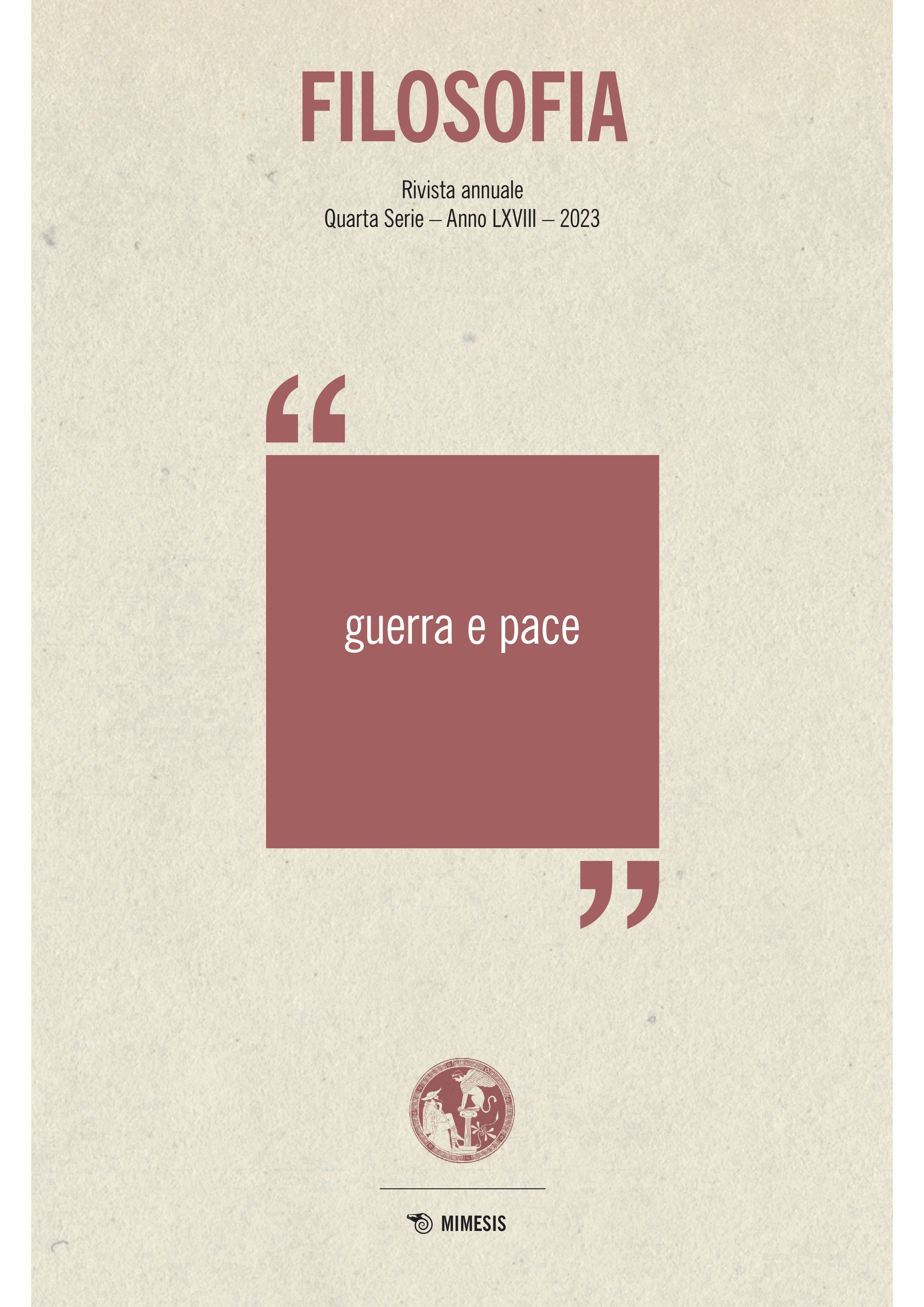Teoria dei valori e storia. La guerra mondiale di Wilhelm Windelband
Parole chiave:
Philosophy oh history, Windelband, Neo-Kantianism, War, Theory of valuesAbstract
In my contribution, I aim to identify the role of war and conflict within Windelband’s philosophy of history. By examining the philosopher’s body of work, it will be shown how the War Lecture, published during the First World War – an event that posed a risk to the destruction of European civilization – is a manifestation of his theory of values in the light of the stress test of the war experience. The theory of values and the idea of history as a tool of philosophy, as a matrix in which cultural values are born, are tested in it. Kant, Fichte, and Hegel’s reflections on history and war constitute the fundamental theoretical baggage of Windelband’s conception. An analysis of the reworking and redefinition of their thought by him will allow us to delineate the specificity of his perspective and his political coloration in the context of Germany in the 1910s.
Downloads
Riferimenti bibliografici
Bauch, Bruno. 1925. Fichte und der deutsche Staatsgedanke: ein Vortrag. Langensalza: Beyer. Beiser, Frederick C. 2008. “Historicism and Neo-Kantianism”. Studies in History and Philosophy of Sciences 39: 554-564.
Beßlich, Barbara. 2000. Wege in der »Kulturkrieg«. Zivilisationskritik in Deutschland 1890-1914. Darmstadt: WBG.
Bohr, Jörn. 2019. “Windelbands Psychologie-Projekte. Das Scheitern eines ambitionierten Programms an seinen Kontexten” in Philosophische Psychologie um 1900, Kessel Thomas, a cura di, 17-38. Stuttgart: J.B. Metzler.
Cassirer, Ernst. 1977. Vita e dottrina di Kant. Tr. it. Gian Antonio De Toni. Firenze: La nuova Italia.
Chang, Tsun-Hwa. 2012. Wert und Kultur. Wilhelm Windelbands Kulturphilosophie. Würzburg: Königshausen & Neumann.
Fichte, Johann Gottlieb. 2003. Discorsi alla nazione tedesca. Tr. it. Gaetano Rametta. Roma-Bari: Laterza.
Flasch, Kurt. 2000. Die geistige Mobilmachung. Die deutschen Intellektuellen und der Erste Weltkrieg. Ein Versuch. Berlin: Alexander Fest.
Fischer, Kuno. 1911. Hegels Leben, Werke und Lehre. Heidelberg: C. Winter.
Foucault, Michel. 2009. Il governo di sé e degli altri. Corso al Collège de France (1982-1983). Tr. it. Mario Galzigna. Milano: Feltrinelli.
Gonnelli, Filippo. 2014. “Il diritto come fine morale. Note sul concetto di “progresso” nella tarda filosofia kantiana” in Rivista di storia della filosofia 69, n. 3: 443-474.
Gundlach, Horst. 2017. Wilhelm Windelband und die Psychologie. Das Fach Philosophie und die Wissenschaft Psychologie im Deutschen Kaiserreich. Heidelberg: Heidelberg University Publishing.
Hegel, Georg Wilhelm Friedrich. 1999. Lineamenti di filosofia del diritto. Diritto naturale e scienza dello stato in compendio. Tr. it. Giuliano Marini. Roma-Bari: Laterza.
Hegel, Georg Wilhelm Friedrich. 2008. La fenomenologia dello spirito. Sistema della scienza, parte prima. Tr. it. Gianluca Garelli. Torino: Einaudi.
Heinz, Marion. 1994. “Die Fichte-Rezeption in der südwestdeutschen Schule des Neukantianismus” in Fichte im 20. Jahrhundert. Fichte-Studien. Beiträge zur Geschichte und Systematik der Transzendentalphilosophie 13, Schrader Wolfgang H., a cura di, 109-129.
Heinz, Marion. 2002. “Fichte und die philosophische Methode bei Windelband” in Der Neukantianismus und das Erbe des deutschen Idealismus: die philosophische Methode, Pätzold Detlev, Krijnen Christian, a cura di. Würzburg: Königshausen & Neumann.
Herder, Johann Gottfried. 1877. Ideen zur Geschichte der Menschheit in Sämtliche Werke XIII, Suphan Bernhard, a cura di. Berlin: Weidmann.
Kant, Immanuel. 1978. Scritti politici e di filosofia della storia e del diritto. Tr. it. Gioele Solari e Giovanni Vidari. Torino: UTET.
Kant, Immanuel. 2006. Metafisica dei costumi. Tr. it. Giuseppe Landolfi Petrone. Milano: Bompiani. Kemper, Matthias. 2006. Geltung und Problem. Theorie und Geschichte im Kontext des Bildungsgedankens bei Wilhelm Windelband. Würzburg: Königshausen & Neumann.
Köhnke, Klaus Christian. 1986. Entstehung und Aufstieg des Neukantianismus. Die deutsche Universitätsphilosophie zwischen Idealismus und Positivismus. Frankfurt a. M.: Suhrkamp. König, Peter. 2018. “Teleologie und Geschichte bei Wilhelm Windelband” in Wilhelm Windelband (1848-1915), König Peter, Schlaudt Oliver, a cura di. Würzburg: Königshausen & Neumann.
Lask, Emil. 1984. Hegel e la concezione del mondo dell’illuminismo in Lask, Emil, Filosofia giuridica. Tr. it. Agostino Carrino. Napoli: ESI.
Lübbe, Herman. 1974. Politische Philosophie in Deutschland. Studien zu ihrer Geschichte. München: dtv.
Medicus, Fritz, 1902. Kants Philosophie der Geschichte. Berlin: Reuther & Reichard.
Meinecke, Friedrich. 1908. “Fichte als nationaler Prophet” in Verlhagen und Klasings Monathshefte 23: 373-378.
Mori, Massimo. 1984. La ragione delle armi. Guerra e conflitto nella filosofia classica tedesca (1770-1830). Milano: il Saggiatore.
Morrone, Giovanni. 2017. “Cultura e storia. La Geschichtsphilosophie di Wilhelm Windelband”. Laboratorio dell’ISPF XIV: 1-30.
Philonenko, Alexis. 1986. La théorie kantienne de l’histoire. Paris: Vrin.
Tuozzolo, Claudio. 2022. “Emil Lask 1905. Hegel illuminista, liberale, realista della ragione, contemplatore del vero”. Archivio di storia della cultura 35: 89-118.
Wild, Christoph. 1970. “Die Funktion des Geschichtsbegriffs im politischen Denken Kants”. Philosophisches Jahrbuch 77: 260-275.
Windelband, Wilhelm. 1890. Fichte’s Idee des deutschen Staates. Rede zur Feier des Geburtstages Seiner Majestät des Kaisers. Freiburg i. B.: J. C. B. Mohr (Paul Siebeck).
Windelband, Wilhelm. 1892. Geschichte der Philosophie. Tübingen: J. C. B. Mohr (Paul Siebeck).
Windelband, Wilhelm. 1920. Einleitung in die Philosophie. Tübingen: J. C. B. Mohr (Paul Siebeck).
Windelband, Wilhelm. 1990. Lezione di guerra. Filosofia della storia. Tr. it. Rossella Bonito Oliva. Salerno: Edizioni 10/17.
Windelband, Wilhelm. 2021. Präludien. Aufsätze und Reden zur Philosophie und ihrer Geschichte, Bohr Jörn, Luft Sebastian, a cura di. Hamburg: Felix Meiner.
Windelband, Wolfgang. 1916. „Vorwort“ in Kantstudien 38, Geschichtsphilosophie. Eine Kriegsvorlesung. Fragment aus dem Nachlass von Wilhelm Windelband, hrsg. von Wolfgang Windelband und Bruno Bauch.
Wolandt, Gerd. 1971. Idealismus und Faktizität. Berlin/New York: de Gruyter.
Yovel, Yirmiyahu. 1980. Kant and the Philosophy of History. Princeton: Princeton University Press.
##submission.downloads##
Pubblicato
Come citare
Fascicolo
Sezione
Licenza
Copyright (c) 2023 Sabato Danzilli

TQuesto lavoro è fornito con la licenza Creative Commons Attribuzione 4.0 Internazionale.
Filosofia applica una licenza Creative Commons Attribution 4.0 International License a tutto il materiale pubblicato.




